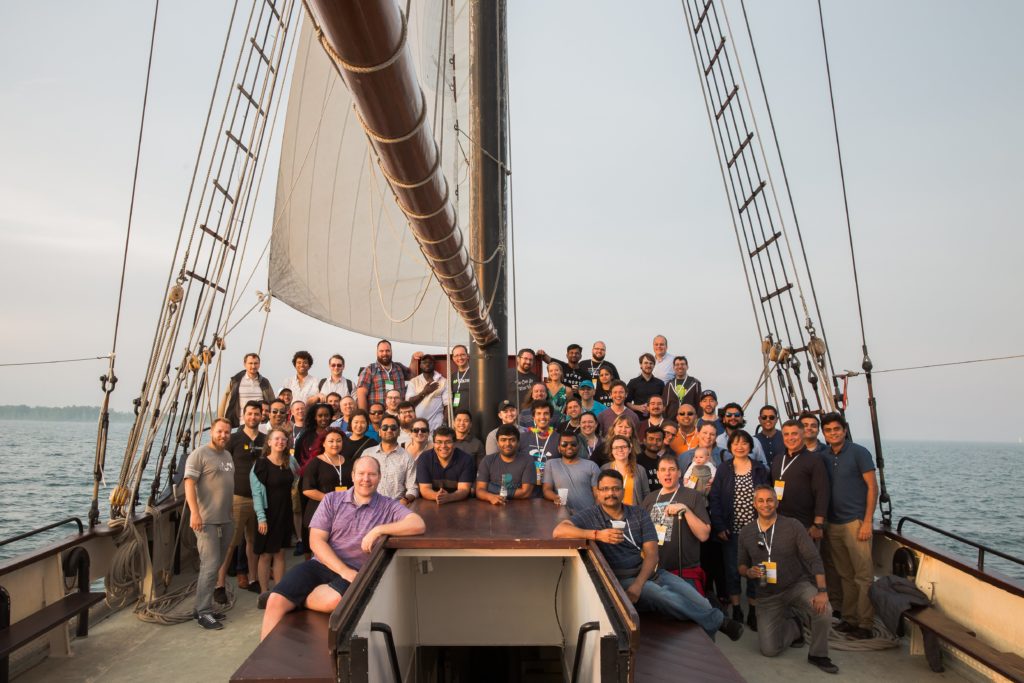Over the weekend, I went to Toronto to meet with other folks from the North American region of the Google Developer Experts program. It’s been an intense couple of years for me, and I’m thinking about how/if to get more involved in the tech community again, so it seemed like an opportune time. And I have a few things I picked up that I thought I’d share.
Because of storms in Philadelphia, I missed the first day of the summit, but was at least able to meet folks for the second day and the main networking event.
How to become a GDE?
I’ve been in the GDE program since 2016, and it’s always been opaque, but it seems that in the last year or two, the program is trying to be more transparent as what the program is, and at the summit, there was some discussion about the program itself, and I haven’t written much (any?) about it. So maybe it’s getting less mysterious?
There’s even a popular community video out now about becoming a GDE.
I disagree with some of the points, or at least, they were not true to my experience. For example, he says you’re nominated by Google or a partner, and that’s not true: any GDE (who are not employed by Google) can refer you. That theoretically also serves to help the applicant out, as you’ve interacted with someone in the program (“why do this anyway?”).
Which is to say: if you’re interested, you should go ahead and apply. That’s why it’s called an application!!
In the video, he also talks about a “portfolio” when in my experience it’s more a CV (multi-page European style) — that’s more accurate to a lot of GDEs who are community organizers, and say, organize meetups, conferences, and workshops (and thus wouldn’t have as many links/portfolio type things).
Some GDEs are more on the organizing side, some on the speaking side, some are podcasters, some are writers, and I’d say most do a mixture of these things. The thing people have in common is that they tend to be connected and known in the developer community (in areas relevant to Google technologies and products), put effort into sharing and connecting with that community, and that they had an interest in being in the GDE program. Alright, more about the summit.
Lightning Talks
Given my short time at the summit, the lightning talks were a treasure, and a couple stood out.
Margaret Maynard-Reid talked about ML study jams, and resource for that, and so I learned about Google Colab, which has free GPU and TPU, and having accidentally spent $100 once trying to learn ML, this is *excellent* news. She also recommended some of the books (Deep Learning with Python) that people tend to use, and a warning that the Machine Learning Crash Course, while awesome, is getting out of date with Tensorflow 2.0 coming.
I also enjoyed Jina Anne‘s talk about how design systems help creativity, not limit it. It was a great talk in lightning talk format (and I’m sure fantastic in longer form), full of interesting references and quotes:
“Collaboration breeds creativity”
Mina Markham
“Patterns are not dogma, they can change and adapt”
Claudina Sarahe
If you’re interested in design systems, Jina invites you to join their Slack: design.systems/slack
And in a talk on learning from a speaking experience, Sam Julien quoted some useful speaking advice from a coach: “When you feel like shrinking, expand”.
Other cool things
While I missed the session that talked about it (there’s video, so I hope to catch up), Sidewalk Labs (which I also have curious political opinions about) has open hours every week.
The summit also set up mentoring hours at a startup accelerator, and I got to talk to a couple startups about their web strategy/architecture, and it was super interesting and felt great to be helpful at a 1:1 level. Loved that section of my (limited) summit experience.
